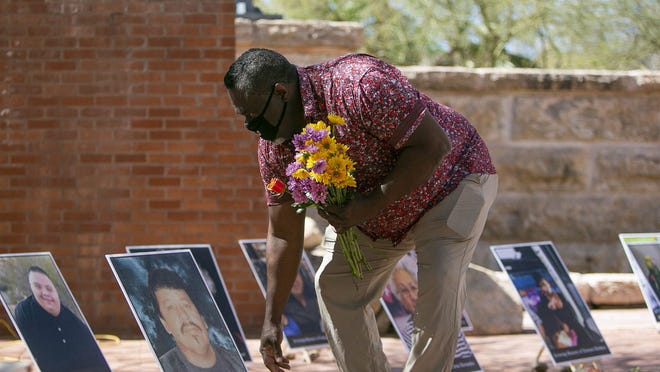
The White House said Tuesday that more than 22 million doses of COVID-19 vaccines will be distributed in the next seven days, a new high that would send the daily average over 3 million for the first time.
Of that total, 16 million doses would be distributed to the states and the rest to federally administered programs, including mass vaccination sites, retail pharmacies and community health centers.
And with higher shipments, more states are allowing all adults to get vaccinated.
Mississippi joined Alaska on Tuesday in opening the vaccine eligibility flood gates. Ohio Gov. Mike DeWine said Tuesday the vaccine will be available to anyone in the state 16 years and older by the end of March, and Connecticut is preparing to open to people 16 years of age and over starting April 5.
Also in the news:
►Former President Donald Trump on Tuesday urged his supporters to get the COVID-19 vaccine. Trump made the pitch during a 20-minute telephone interview with Fox News.
►The health minister of Canada’s most populous province says Ontario seniors won’t receive the Oxford-AstraZeneca COVID-19 vaccine since there’s limited data on its effectiveness in older populations.
►B.1.427, the variant first discovered in California, is now a "variant of concern" according to the Centers for Disease Control and Prevention. It has 20% increased transmissibility, and is moderately neutralized by vaccines, according to the CDC.
►Moderna has given the first COVID-19 vaccine doses to children under 12 years of age, the company announced Tuesday. The Massachusetts-based biotech company intends to recruit 6,750 healthy kids under 12 for the trial.
►Just over 1 million Arizona residents are now fully vaccinated against COVID-19, state officials announced Tuesday.
? Today's numbers: The U.S. has over 29.5 million confirmed coronavirus cases and more than 536,000 deaths, according to Johns Hopkins University data. The global totals: More than 120 million cases and 2.66 million deaths. Nearly 143 million vaccine doses have been distributed in the U.S. and more than 111 million have been administered, according to the CDC.
? What we're reading: If you get the choice, which COVID-19 vaccine should you choose? For now, experts are clear: The best vaccine is the one about to go into your arm. But as the vaccine supply grows, Americans eventually might find someone asking, “Which vaccine do you want?”
USA TODAY is tracking COVID-19 news. Keep refreshing this page for the latest updates. Want more? Sign up for our Coronavirus Watch newsletter for updates to your inbox and join our Facebook group.
Thousands of Latinos were sterilized in the 20th century. Amid COVID-19 vaccine hesitancy, they remember
Virginia Espino, a professor at the University of California, Los Angeles, and an expert in reproductive injustice, said it’s unclear how many women were sterilized at the LAC-USC Medical Center. The lawyer for the women who brought the lawsuit estimated "hundreds.”
Many didn’t speak fluent English and didn’t understand the forms they signed and, in some cases, were coerced into signing. Many had labor complications and were told lies that they or their babies would die if they didn't sign.
"As far as justice, they never received that," said Espino, who documented the women's stories as co-producer of a film called "No Mas Bebés," ("No More Babies" in Spanish). Insidious sterilizations didn’t occur inside that hospital only. Throughout the 20th century, about 20,000 women and men were sterilized in California alone under state eugenics policies, according to researchers. The policies targeted patients of state-run asylums or group homes. A disproportionate number were Hispanic.
As COVID-19 vaccine rollout continues, hesitancy among vulnerable communities, including Hispanic people, is piqued — and history is unearthed. Read the full story.
-- Nada Hassanein
Duke reports highest number of positive cases in a single week
Duke University, already operating under lockdown to combat a rise in coronavirus infections, on Tuesday reported 231 cases from last week, almost as many as the school had the entire fall semester.
"This was the highest number of positive cases reported in a single week," the school said in a statement. "The individuals who tested positive have been placed in isolation, while those identified as potential contacts have been placed in precautionary quarantine."
The school issued a "stay in place" order Saturday, requiring students living in Duke-provided housing to remain in their residence hall room or apartment at all times except for essential activities related to food, health or safety. Students living off-campus are required to stay there, with a few exceptions.
Rush events by unaffiliated fraternities appear to be the main culprit for the outbreak.
“This (stay-in-place) action is necessary to contain the rapidly escalating number of COVID cases among Duke undergraduates, which is principally driven by students attending recruitment parties for selective living groups,” the university said.
US experts question EU decision to suspend AstraZeneca vaccine
Sweden on Tuesday joined the growing number of European nations suspending the use of AstraZeneca’s COVID-19 vaccine — a list that includes Germany, France, Spain and Italy — because of reports about a possible link to blood clots that the company and other experts say likely are unrelated to the vaccine. The temporary pause has been branded as irresponsible by some U.S. scientists, who say it threatens the global vaccination effort.
"It creates the perception that these vaccines are dangerous," said Dr. Paul Offit, director of the Vaccine Education Center at Children's Hospital of Philadelphia. "The only way out of this pandemic is by vaccination.''
The World Health Organization has urged countries to continue using the vaccine, saying there's no evidence of a connection to blood clots. Canadian health authorities not only reaffirmed their belief that the AstraZeneca vaccine is safe, but changed their recommendation Tuesday so that the drug is available to people 65 years and over, as well.
Offit said taking the AstraZeneca vaccine off the market without strong supporting evidence could adversely impact the perception of other vaccines. "While it's easy to scare people, it's very hard to unscare them," he said.
Contributing: The Associated Press
Source link








